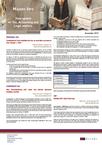
Mazars Info November 2019
PERSONAL TAX
Constitutional Court abolishes the tax on securities accounts as from October 1, 2019
On March 10, 2019 the tax on securities accounts entered into force. This tax of 0,15% was due by individuals on financial instruments held through securities accounts if the minimum value of these financial instruments amounts to 500.000 EUR or more per account holder. For more details, we refer to our previous newsletters.
On October 17, 2019 the Constitutional Court (case n° 138/2019) declared this tax on securities accounts unconstitutional. They ruled that the government may strive for more tax justice by levying a tax on larger assets, but that this current tax on securities accounts is discriminatory.
The following reasons were brought forward:
- the tax only envisages certain financial instruments;
- it only envisages shares held through a securities account (and not registered shares); and;
- the regulation fails to prevent escape from the tax on securities accounts in case the account is held by several individuals.
For budgetary reasons the Constitutional Court only abolishes the tax on securities accounts for the future thus as from October 1, 2019.
Taxes paid in the past cannot be reclaimed based upon the discrimination brought forward in this judgement. In principle a declaration will need to be filed and tax should be paid for the last time by you or your Belgian intermediary (bank) for the reference period from October 1, 2018 until September 30th, 2019.
CORPORATE TAX
New "Grandfathering rule" under new interest deduction limitation clarified
On September 11, 2019 the Belgian tax administration published a Circular Letter (Circ. 2019/C/89 dd. September 11, 2019) on the grandfathering provision that is included in the recently introduced interest deductibility limitation (‘thin cap’) rule.
As from tax year 2020 onwards, the deduction of net interest charges is limited to the higher of € 3.000.000 and 30% of the taxable EBITDA. This new thin cap rule (inspired by ATAD 1) partially replaced the existing 5/1 thin cap rule, where the excess interest is considered as a non-deductible expense to the extent all loans exceed five times the sum of the taxed reserves at the start of the relevant financial year and the paid-in share capital at the end of the financial year (art. 198, §1, 11° WIB92).
However, loans concluded before June 17, 2016 which have not been fundamentally modified since that date are excluded from the new thin cap rule (grandfathering). These grandfathered loans remain subject to the existing 5/1 thin capitalization rules.
The tax administration now clarified the notion "fundamental modifications" with a less strict interpretation.
The circular letter enumerates a number of changes that are considered to be fundamental changes. These include:
- A modification of the term of the loan, interest rate or interest calculation not contractually foreseen prior to June 17, 2016;
- A modification of the principal loan amount;
- A modification or replacement of one or more of the initially involved parties;
- Any kind of debt renewal (novation) in the meaning of art. 1271 of the Civil Code;
- Any modification imposed by the legislator or a supervising authority.
Minor administrative changes such as the modification of an account number or a change of the name, legal form or address of one of the contracting parties is no longer considered to be a fundamental change.
A fundamental modification to a loan as from June 17, 2016, that would in principle have been entitled to grandfathering, results in an entire loss of the grandfathering. All interest relating to the period as from the fundamental modification will fall into the scope of application of the new thin cap rule.
We advise to review in detail whether a "fundamental change" to one (or more) loan agreements could result in a higher interest deduction. Indeed, if your company reported non-deductible IC interest under the existing 5/1 thin cap rule in the previous years, the new thin cap rule could offer a solution. Of course, any modification should be underpinned by genuine business purposes.
Mazars can assist your company with the review of its thin cap position and assess optimization.
VAT
Monthly VAT refund Start-ups
As of January 1, 2020 Belgian start-ups can opt for a monthly reimbursement of Belgian VAT instead of a VAT reimbursement on a quarterly basis. This has been decided by a Royal Decree of August 29, 2019.
In the beginning of the activities, start-up companies make a lot of investments and incur quite some expenses, resulting in a VAT credit owed by the Belgian Tax Authorities. To counter cash flow issues, the Belgian Tax Authorities provide start-up companies the opportunity to apply for a monthly VAT refund as of January 1, 2020.
Under the normal procedure, it can take up to 6 months for start-ups who opted for a quarterly VAT return to receive its VAT credit. Only VAT-payers submitting a monthly VAT return and having a required license, receive their VAT refund on a monthly VAT basis.
Conditions
However as of January 1, 2020, start-ups could opt for a monthly refund without such permission if they fulfil certain conditions.
- The monthly VAT refund can only be applied in the first 24 months in which the Belgian VAT-payer has started its economic activities.
- The VAT credit amounts at least 245 EUR/month.
- The VAT return must be filed electronically.
- The VAT-payer should of course be compelled to file monthly VAT returns (or opted to do so at the moment of activation of the VAT-number, even though the annual turnover does not exceed 2,5 million EUR).
For start-ups fulfilling these conditions, the VAT will be reimbursed before the end of the month after following the month of filing the VAT return.
Start-ups filing quarterly VAT returns will be reimbursed before the end of the second month after the (quarterly) filing of the VAT-return.
Exceptions
The Belgian VAT authorities make exceptions in case of irregularities.
LABOUR LAW
Flemish training leave as of September 1, 2019
What is Flemish Training Leave?
The Flemish Training Leave is the replacement of the Paid Educational Leave since September 1, 2019. The goal of this training leave is to encourage employees to follow labour market and career-oriented training courses. Therefore the employee is entitled to be absent from work with the retention of salary (limited to 2.928 EUR) to follow a course or to study or take exams. Moreover, the employer can obtain a partial refund for the hours of leave taken.
The novelties
- The employee is entitled to 125 hours of Flemish Educational Leave per school year as opposed to 180 hours Paid Educational Leave.
- Only the courses included in the database will open the right to Flemish Training Leave.
There are also changes with respect to some specific obligations of the employee, the employer and the training institution.
- The employer must follow the training closely. Otherwise, the number of hours of Flemish Training Leave to which he is entitled will decrease.
- The employer must apply for the reimbursement of the Flemish Training Leave online at the latest 3 months after the start of the training. However, the amount of the contribution is still 21,30 EUR per hour.
The registration certificate
The registration certificate is the certificate that the employee receives from the school. This certificate must be submitted at the latest on October 31 of the current school year or at the latest 15 days after registration or after a change from employer.
If the employee does not respect this deadline, the employer has the right to refuse the leave.
It is not only important to deliver the registration certificate on time. Of course, it is also important that the certificate is correct.
The following information must appear on the certificate:
- Employee data (surname and first name, national register number);
- Data on the training provider (name, CBE-number or institution number);
- Data on the training (title of the training, (where applicable) the module, registration number in the training database, the start and end dates and the date of examination).
Please note that the employee entitled to Flemish Training Leave is protected against dismissal.
In this respect, the specialists of our legal team can provide you with more detailed advice.
COMPANY LAW
New Belgian Companies and Associations Code – Important changes in respect to the permanent representatives
The new Belgian Companies and Association Code, which entered into force on May 1, 2019, made a number of significant changes to, amongst others, the rules in respect to the permanent representatives.
When a legal entity is appointed as a director, member of the management board or a delegate to the daily management of a company, it has to appoint a so-called ‘legal representative’ to carry out such mandate in the name and on behalf of this legal entity. This legal representative must be an individual.
At present, it is established practice that a legal entity which assumes the role of director in a company, appoints another legal entity as its permanent representative, which in its turn appoints an individual as permanent representative. This practice results in a ‘cascade’ of permanent representatives.
Under the new Belgian Companies Code, this will no longer be possible. A legal entity which is appointed as director will only be able to appoint an individual as its permanent representative, which favours transparency.
Moreover, under the new Belgian Companies Code it will no longer be possible that an individual is a member of the board of directors in two different capacities, being 1) as an individual and 2) as permanent representative of one or more legal entities appointed as director.
Finally, the new legislation explicitly states that the procedure regarding the ‘conflict of interests’ is also applicable to permanent representatives.
Please note that the aforementioned rules, are qualified as mandatory provisions, which implies that companies should comply with these rules as from January 1, 2020. These rules may have an impact on your company, so we recommend to verify the composition of the board of directors of your company.
Mazars can assist with necessary changes within your board of directors. Please contact us for further information.
KEEP IN MIND!
VAT
- VAT return October 20, 2019: before November 20, 2019
PERSONAL INCOME TAX RETURN
- Personal income tax return – Belgian residents
o Via proxyholder: November 7, 2019 (postponed)
- Personal income tax return – Belgian non-residents
o On paper: November 22, 2019 (postponed)
o Via proxyholder: December 5, 2019

